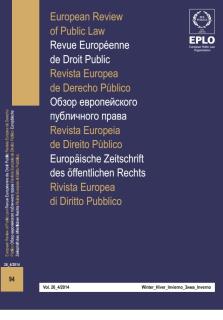
Constitutional Law / Droit constitutionnel
2013
POLAND / POLOGNE
KRZYSZTOF WOJTYCZEK
PROFESSOR AT THE JAGIELLONIAN UNIVERSITY
The year 2013 was another year characterized by stability of Polish constitutional law and constitutional practice. The parliament adopted an Act on procedure concerning persons with psychological troubles who pose a threat to life, health or sexual freedom of other persons, as well as modifications to the Act on the Minister of Defense. The legislature also authorized the ratification of two additional international instruments abolishing the death penalty. Substantive changes were introduced to the rules of the Senate. The constitutional practice was marked by the reshuffle of the cabinet, the rejection of a constructive no-confidence motion and two bye-elections to fill vacancies in the Senate. An important number of judgments of the Constitutional Court pertain to the judiciary and its place in the constitutional system. One of the high profile judgments concerns the ratification of the European Council Decision of 25 March 2011 amending Article 136 of the Treaty on the Functioning of the European Union (2011/199/EU). The most important human rights cases concern restitution to the churches and religious denominations of property confiscated under the communist regime and judicial discretion in criminal matters. The continuity and the stability of the case law of the Constitutional Court reinforce the legitimacy of the Court.
L'année 2013 a été une année de plus caractérisée par la stabilité du droit constitutionnel et de la pratique constitutionnelle polonais. Le parlement a adopté la Loi sur la procédure concernant des personnes ayant des troubles psychologiques et qui constituent une menace pour la vie, la santé ou la liberté sexuelle d'autres personnes, et les modifications à la Loi sur le Ministre de la Défense. Le pouvoir législatif a aussi autorisé la ratification de deux instruments internationaux additionnels abolissant la peine de mort. Des modifications substantielles ont été apportées au règlement du Sénat. La pratique constitutionnelle a été marquée par le remaniement ministériel, le rejet d'une motion de censure constructive et deux élections partielles pour pourvoir les sièges vacants au Sénat. Un nombre important d'arrêts de la Cour constitutionnelle a trait au pouvoir judiciaire et sa place dans le système constitutionnel. L'un des arrêts les plus importants porte sur la ratification de la décision du Conseil européen du 25 mars 2011 modifiant l'article 136 du Traité sur le fonctionnement de l'Union européenne. Les affaires les plus importantes pour la protection des droits de l'homme concernent la restitution aux églises et autres communautés religieuses des biens confisqués sous le régime communiste ainsi que le pouvoir discrétionnaire du juge en matières pénales. La continuité et la stabilité de la jurisprudence de la Cour constitutionnelle renforcent la légitimité de la Cour.





















